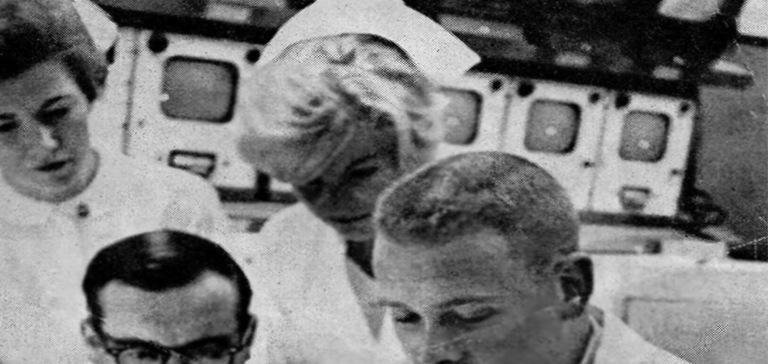Virginia Fowkes graduated from Duke University School of Nursing in 1964. At Duke, she became one of the first clinical specialists in nursing to work. She co-authored a landmark book in coronary health care and became an instructor in the field. She became involved in teaching physician assistants when Dr. Eugene A. Stead, Jr. began the program in 1965 — teaching cardiology to the first three classes of students, mostly former military corpsmen. She also began her research interests as a clinician in coronary care and participated in a seminal study about transitional units. Later at Stanford University, she worked closely with the Regional Medical Programs (RMP) to establish future primary care programs. One of these programs was the first experimental family nurse practitioner (FNP) program in the state, enrolling four students. Fowkes became certified as a FNP when legislation was enacted and earned a master’s degree in health services from the University of California, Davis.
Fowkes became involved in the newly evolving disciplines of primary care, family medicine, physician assistant and family nurse practitioner education. During her 43 plus-year tenure at Stanford University School of Medicine, she served as Project Director and/or Principal Investigator for numerous academic programs within Family Medicine, Regional Medical Programs, Area Health Education Centers (AHEC) Program, Primary Care Associate Program (PCAP) and 17 sponsored research studies. Through RMP, she helped establish the PCAP to train both PAs and FNPs and became its director in 1974, a position she held for more than 30 years. As director, she provided the leadership to develop the PCAP into a statewide community based program with a reputation as a national and state model for community training, graduate retention in areas of need, and diversity. She helped to develop and implement California’s Song Brown Program which legislation funded family physician and PA and NP training and served as an advisor for its policy development. In addition, she assisted in the early start-up of both PA and NP programs in California and advocated as a state leader in the revision of practice regulations for both professionals. She co-founded and chaired the first Statewide Council for PA/NP educators.
In 1979, she assisted in founding the Division of Family and Community Medicine at Stanford with the merger of the PCAP and the San Jose Family Medicine Residency Program providing the first team training of family medicine residents with PA and NP practitioners who served as preceptors for both residents and students. In 1980, on behalf of the medical school and as part of the California Statewide AHEC Program, she co-founded the Stanford-South Bay AHEC, one of the early national inner city AHECs and one of Stanford’s early academic community partnerships. The AHEC program was instrumental in “decentralizing” medical students’ education by providing them rotations in community- based primary care settings, many in underserved communities.
Fowkes’ academic career has focused on developing, implementing, and evaluating programs which train health professionals for medically underserved communities. She has served as an executive advisor and directed the evaluation for the California Statewide AHEC Program helping the AHEC as well as the California’s Office of Statewide Health Planning and Development develop and evaluate regional programs, particularly with community health centers, including an emergency preparedness program, retention and evaluation activities for National Health Service Corps clinicians, and a community health curriculum with clinical experience for health professions students.
Fowkes has served as a consultant for federal and state governments and agencies in policy formation about health professions education, guided medical schools in starting and evaluating their AHEC programs, developed evaluation and conducted program reviews, and served on national advisory and review committees. In 1988, she was invited by the National Health Institute of Botswana, South Africa to evaluate the country’s nurse practitioner program. She has directed or collaborated with national studies designed to evaluate: the national AHEC program, PAs, NPs and CNMs practicing with underserved populations, curriculum development, factors influencing the retention of primary care providers in rural areas, a satellite educational communications system; and unlicensed foreign medical graduates in California. She has authored or co-authored numerous publications, mostly in peer reviewed journals and many unpublished reports and abstracts associated with her studies or external and internal policy issues.
She has held memberships in the Society of Teachers in Family Medicine, Coastal Research Group, and the National Consortium of Primary Care Access in which she remains a Senior Fellow. She received a recognition award from the California Healthcare Workforce Policy Commission in 2006.
Acknowledgments: This biography was written by Reginald Carter with the assistance of Virginia Fowkes, and was submitted to the Society in September 2013. The portrait photograph is courtesy of Stanford University.
When using information from this biography, please provide the proper citation as described within the PA History Society Terms of Use.




